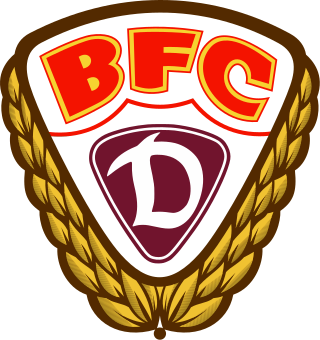
Sportgemeinschaft Dynamo Dresden e.V., commonly known as SG Dynamo Dresden or Dynamo Dresden, is a German association football club based in Dresden, Saxony. They were founded on 12 April 1953 as a club affiliated with the East German police and became one of the most popular and successful clubs in East German football, winning eight league titles.

Berliner Fussball Club Dynamo e. V., commonly abbreviated to BFC Dynamo or BFC, alternatively sometimes called Dynamo Berlin, is a German football club based in the locality of Alt-Hohenschönhausen of the borough of Lichtenberg of Berlin. The team competes in the Regionalliga Nordost, the fourth tier of German football
FRÖSI was a children's magazine which was published by Junge Welt in the German Democratic Republic. The expanded title of the magazine was Fröhlich sein und Singen. It was the magazine for members of the Ernst Thälmann Pioneer Organisation. The word FRÖSI comes from the first line of the at that time familiar pioneer song "Fröhlich sein und singen". This title in full length was used until 1965, then the short form replaced it. The first edition was released on 25 June 1953. At first it was published every 6 weeks, from 1956 monthly.

1. Fußballclub Union Berlin e. V., commonly known as Union Berlin, is a professional German football club based in Köpenick, Berlin.

Hilde Benjamin was an East German judge and Minister of Justice of the German Democratic Republic. She is most notorious for presiding over the East German show trials of the 1950s, which drew comparisons to the Nazi Party's Volksgericht show trials under Judge Roland Freisler. Hilde Benjamin is particularly known for being responsible for the politically motivated prosecution of Erna Dorn and Ernst Jennrich. In his 1994 inauguration speech German President Roman Herzog cited Hilde Benjamin as a symbol of totalitarianism and injustice, and called both her name and legacy incompatible with the German Constitution and with the rule of law.
Henrietta Ebert is a German rower who won the gold medal at the 1976 Summer Olympics and was a member of the SC Dynamo Potsdam.
Irina Müller is a German rower, who won the gold medal at the 1976 Summer Olympics and was a member of the SG Dynamo Potsdam.
Anke Borchmann is a rower who competed for East Germany in the 1970s.
Jana Sorgers is a German rower who was a dominant sculler of her time, starting her career for the East German rowing team and continuing after the German reunification for the combined Germany for a few more years. Between 1986 and 1996, she won two Olympic gold medals, seven world championship titles, and nine national titles. Upon the conclusion of her successful career, she was awarded the Thomas Keller Medal by the International Rowing Federation (FISA) – the highest honour in rowing.

Ramona Balthasar-Franz is a German rower.
Ute Schell is a German rower, who competed for the SG Dynamo Potsdam / Sportvereinigung (SV) Dynamo. She has won several medals at international rowing competitions. She was first coached by Herta Weissig and then Wolfgang Schell.

Hannelore Anke is a retired German swimmer who competed for East Germany in the 1970s.
Gabriele "Gabi" Kühn is a German rower who competed for East Germany in the 1976 Summer Olympics and the 1980 Summer Olympics.
Roswietha Zobelt is a German rower who competed for East Germany in the 1976 Summer Olympics and in the 1980 Summer Olympics.

Central Stadium was a stadium with a capacity of 120,000 in Leipzig which was initially used for matches of SC Rotation Leipzig.
Manfred Merkel is a retired slalom canoeist who competed for East Germany.
Cornelia Klier is a German rower. She married in 1980 prior to attending the Olympic Games and used her married name in Moscow.

Deutscher Verlag der Wissenschaften (DVW) was a scientific publishing house in the former German Democratic Republic.

Harry Weibel is a German historian. His main topics are neo-Nazism, right-wing extremism and antisemitism in the GDR and racism in Germany from 1945 to the present.
Verlag Enzyklopädie was an East-German publishing house located in Leipzig. It was founded on 1 November 1956 by the German Democratic Republic (GDR) as a VEB. In 1964, the publishing house was merged with the larger VEB Bibliographisches Institut (BI), with which it had previously cooperated already, but it retained its legal independence.
This page is based on this
Wikipedia article Text is available under the
CC BY-SA 4.0 license; additional terms may apply.
Images, videos and audio are available under their respective licenses.









